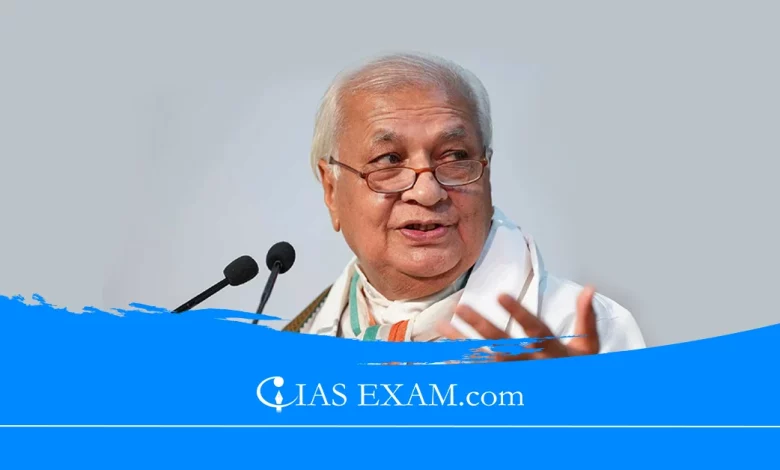Daily Current Affairs for UPSC
Legality of Withholding of Presidential assent of Bills
Syllabus- Polity & Governance [GS Paper-2]

Context
Kerala government will challenge before the Supreme Court the legality of the President, withholding assent for the Bills which were passed by the Kerala Legislature.
About
- The President had withheld assent to Kerala University Laws (Amendment No. 2) Bill 2022, University Law Amendment Bill, 2022, and the University Law Amendment Bill, 2021 from the seven Bills that had been referred to her in 2023.
- Kerala argues that the Governor should not have referred the Bills to the President as its subject matters have been constrained to the State List of the Constitution where the State has powers to legislate.
Governor’s power with respect to the Bills
- Article 200 of the Constitution lays down that when a Bill, passed by a State Legislature, is presented to the Governor for their assent, they have got 4 options:
- May provide assent to the Bill;
- May withhold assent to the Bill, in which case the Bill fails to become law;
- May return the Bill (if it isn’t a Money Bill) for reconsideration of the State Legislature; or However, if the bill is passed again by means of the state legislature without or with amendments, the governor has to offer his assent to the bill, or
- May reserve the Bill for the consideration of the President.
Reservation of bill for President consideration
- In one case such reservation is obligatory, in which the bill passed by the state legislature endangers the position of the state high court.
- In addition, the governor can also reserve the bill if it’s of the following nature:
- Ultra-vires, that is, against the provisions of the Constitution;
- Opposed to the Directive Principles of State Policy;
- Against the larger interest of the country;
- Of grave national significance;
- Dealing with compulsory acquisition of property under Article 31 the Constitution.
Sarkaria Commission recommendations
- The Commission has submitted that it’s only the reservation of Bills for consideration of the President, that too under certain instances of unconstitutionality, that may be implied as a discretionary power of the Governor.
- Save in such exceptional cases, the Governor must discharge his responsibilities under Article 200 as per the advice of ministers.
- It further recommended that the President should dispose of such Bills within a maximum period of six months.
- In the event of the President ‘withholding assent’, the motives have to be communicated to the State Government wherever possible.
Way Ahead
- The constitution empowers the governor to reserve a bill for the President’s consideration. This is an essential ‘discretionary power’ that is vital for the governor to ensure that state’s legal guidelines fall within the framework of the charter.
- There cannot be a parallel administration in the state by permitting the governor to go against the recommendation of the council of ministers.
- There isn’t any doubt that these need to be modified, both by amending the Constitution or through an appropriate Supreme Court verdict, so that misuse of gubernatorial discretion can be kept in check.
Source: The Hindu
UPSC Prelims Practice Questions
Which of the following are the discretionary powers given to the Governor of a State? (2014)
- Sending a report to the President of India for imposing the President’s rule
- Appointing the Ministers
- Reserving certain bills passed by the State Legislature for consideration of the President of India
- Making the rules to conduct the business of the State Government
Select the correct answer using the code given below:
a. 1 and 2 only b. 1 and 3 only
c. 2, 3 and 4 only d. 1, 2, 3 and 4
Ans: “b”





.png)



